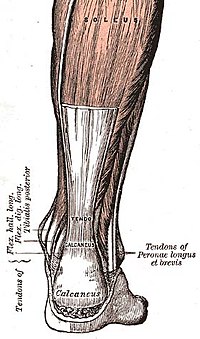
Photo from wikipedia
PurposeTo assess the effects of medical comorbidities on the incidence of surgical site infection following primary Achilles tendon repair. A secondary aim was to assess the effects of specific medical… Click to show full abstract
PurposeTo assess the effects of medical comorbidities on the incidence of surgical site infection following primary Achilles tendon repair. A secondary aim was to assess the effects of specific medical comorbidities on the cost and extent of healthcare utilization related to surgical site infection following primary Achilles tendon repair.Methods24,269 patients undergoing primary Achilles tendon repair between 2005 and 2012 were examined. Current Procedural Terminology codes for primary Achilles tendon repair, and incision and drainage were used to search for and compile patient data from the United Healthcare Orthopedic and Medicare databases. Primary outcome measures regarding surgical site infection following primary Achilles tendon repair included the rate of occurrence, cost, and duration of treatment.ResultsPatients with one or more preexisting medical comorbidities at the time of surgery had an increased rate of surgical site infection compared to those without. Diabetes and vascular complications were associated with the highest surgical site infection rates. The rate of surgical incision and drainage was higher in patients with cardiac arrhythmias and uncomplicated hypertension. The presence of a medical comorbidity significantly increased the cost and duration of surgical site infection treatment.ConclusionsMedical comorbidities can complicate the postoperative course for patients undergoing Achilles tendon repair, which increases the cost of care and duration of treatment. A better understanding of the relationship between each medical comorbidity and surgical site infections following Achilles tendon repair may be ascertained with additional prospective studies, thus, allowing for a more accurate evaluation and stratification of surgical candidates to improve patient outcomes.Level of evidenceRetrospective cohort study, Level III.
Journal Title: Knee Surgery, Sports Traumatology, Arthroscopy
Year Published: 2019
Link to full text (if available)
Share on Social Media: Sign Up to like & get
recommendations!